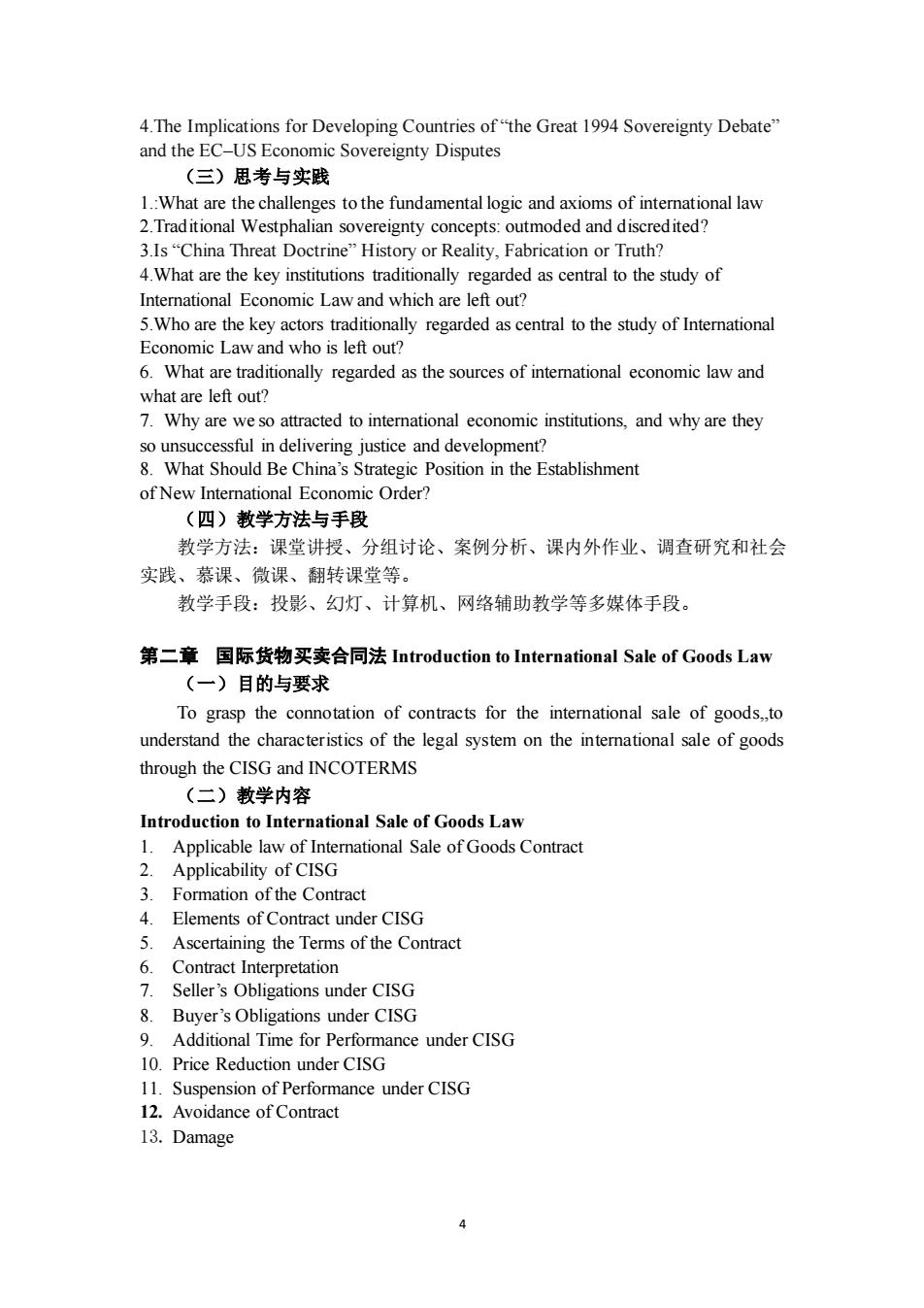正在加载图片...

4.The Implications for Developing Countries of"the Great 1994 Sovereignty Debate" and the EC-US Eco Sovereignty Disputes (三)思考与实践 1.:What are the challenges to the fundamental logic and axioms of international law 2.Traditional Westphalian sovereignty concepts:outmoded and discredited? 3.Is"China Threa Doctrine"His y or Reality,Fabrication or Truth? 4.What are the key institutions traditionally regarded as central to the study of International Economic Law and which are left out? 5.Who are the key actors traditionally regarded as central to the study of Interational Economic law and who is left out? 6.Wha traditionally regarded as the sources of intemational economic law and what are left out? 7.Why are we so attracted to international economic institutions.and why are they so unsuccessful in delivering justice and development? 8.What Should Be China's Strategic Position in the Establishment onomic Order? (四)教学方法与手段 教学方法:课堂讲授、分组讨论、案例分析、课内外作业、调查研究和社会 实践、慕课、微课、翻转课堂等。 教学手段:投影、幻打、计算机、网络铺助教学等名媒体手段 第二章国际货物买卖合同法Introduction to International Sale of Goods Law (一)目的与要求 To grasp the connotation of contracts for the international sale of goods.to understand the characteristics of the legal system on the intemational sale of goods through the CISG and INCOTERMS (二)教学内容 Introduction to International Sale of Goods Law 1.Applicable law of International Sale of Goods Contract Applicability of CISG Formation of the Contrac Elements of Contract under CISG 5 Ascertaining the Terms of the Contract 6 Contract Interpretation 7.Seller's Obligations under CISG 8. Buyer'sblations under C Additional Time for Performance under CISG 10.Price Reduction under CISG 11.Suspension of Performance under CISG 12.Avoidance of Contract 13.Damage 4 4.The Implications for Developing Countries of “the Great 1994 Sovereignty Debate” and the EC–US Economic Sovereignty Disputes (三)思考与实践 1.:What are the challenges to the fundamental logic and axioms of international law 2.Traditional Westphalian sovereignty concepts: outmoded and discredited? 3.Is “China Threat Doctrine” History or Reality, Fabrication or Truth? 4.What are the key institutions traditionally regarded as central to the study of International Economic Law and which are left out? 5.Who are the key actors traditionally regarded as central to the study of International Economic Law and who is left out? 6. What are traditionally regarded as the sources of international economic law and what are left out? 7. Why are we so attracted to international economic institutions, and why are they so unsuccessful in delivering justice and development? 8. What Should Be China’s Strategic Position in the Establishment of New International Economic Order? (四)教学方法与手段 教学方法:课堂讲授、分组讨论、案例分析、课内外作业、调查研究和社会 实践、慕课、微课、翻转课堂等。 教学手段:投影、幻灯、计算机、网络辅助教学等多媒体手段。 第二章 国际货物买卖合同法 Introduction to International Sale of Goods Law (一)目的与要求 To grasp the connotation of contracts for the international sale of goods,,to understand the characteristics of the legal system on the international sale of goods through the CISG and INCOTERMS (二)教学内容 Introduction to International Sale of Goods Law 1. Applicable law of International Sale of Goods Contract 2. Applicability of CISG 3. Formation of the Contract 4. Elements of Contract under CISG 5. Ascertaining the Terms of the Contract 6. Contract Interpretation 7. Seller’s Obligations under CISG 8. Buyer’s Obligations under CISG 9. Additional Time for Performance under CISG 10. Price Reduction under CISG 11. Suspension of Performance under CISG 12. Avoidance of Contract 13. Damage